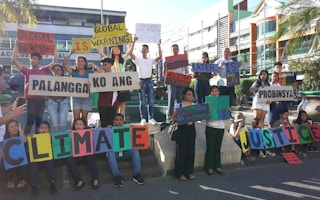The Philippines took another step towards a greener future when the local officials of Negros Occidental, a province in the Visayan region, issued an executive order on March 6 declaring the province as coal-free, and signing a mandate to pursue clean and renewable energy projects.
The announcement immediately impacts—and writes out—plans to build coal-fired power plants in the province, including a 300-megawatt plant proposed last year by SMC Global Power Holdings Corporation, one of the Philippines’ biggest conglomerates.
The announcement was made as the largest youth-led mobilisation for climate action in the country made their voices heard outside the provincial capitol building.
At a time when youth-led strikes worldwide are influencing climate governance, the Negrosanon youth made their own stand for their future.
“Hope is our currency; a single act can inspire millions to rise and abandon apathy,” said Krishna Ariola, lead convenor of the Youth for Climate Hope (Y4CH), one of the organisations that led the protests.
Fighting for a better future
Y4CH is one of the many groups in Negros Occidental that aims to empower their fellow youth to act against climate change. They visit schools around the province to educate students about climate change and energy and provide awareness to participate in local policy-making.
“
Hope is our currency; a single act can inspire millions to rise and abandon apathy.
Krishna Ariola, lead convenor, Youth for Climate Hope (Y4CH)
“We have seen what can happen once the youth is empowered, and Y4CH is a venue for sharing success stories even in the midst of the climate crisis, in order to keep inspiring actions,” Ariola said.
Despite being a leader in renewable energy, especially solar power, most of Negros Occidental’s electricity comes from coal-fired power plants from neighbouring Cebu and Iloilo.
Protesting organisations thought of forming a coalition with other youth-led groups to voice their opposition to coal. However, organising a massive campaign did not come without challenges, according to Ariola.
“Working on advocacy can sometimes become frustrating and tiring; add in the fact that our schedules don’t align, we have zero financial resources, and we have work and school to attend to,” she said.
To overcome these, Y4CH turned to social media, specifically Facebook, for crowdsourcing and reaching out for partnerships in organising the strike. They also campaigned school-to-school to gather more supporters.
Their initial volunteer meetings were met with enthusiasm and passionate responses. Within two weeks, their numbers grew from dozens to thousands, attracting support from the youth of neighborinneighbouringiental and other localities.
“The Negrosanon youth have come so far in asserting our demand to be listened to and to be included in decisions that involve the future we are set to inherit,” Ariola added.
Their efforts culminated in “Youth Strike for Negros” protest action.
Go-getters
While the executive ordinance was a huge victory for Negros Occidental, it is merely the first step towards fully embracing cleaner energy. Y4CH member Claudia Gancayco said that the organisation will continue campaigning for an ordinance to be passed, a stronger sign of commitment for what has been an inter-generational struggle.
“We have been fighting the exact same fight that was fought by our parents and grandparents before us,” she said. “Negrosanons have fought enough battles against coal for us to finally put our foot down and demand for this one to be the last big fight, and we are determined to win it. This has been two decades overdue.”
Considering the widespread impacts of climate change on various facets of development in the province, Y4CH also calls for local and national leaders to realign their governance approach towards sustainable development.
“We are in a state of crisis due to climate change, and if our leaders do not think we should make rapid and drastic changes to combat the crisis, then they need to revisit the definition of true leadership and public service. They make the big decisions; we can only hope that they make the right ones,” Ariola said.
While Y4CH considers bringing its advocacy to the national level to inspire more young people to participate, it will focus more on organising localised, geographically-relevant campaigns moving forward.
According to Ariola, “we believe in starting movements from the grassroots and empowering local initiatives. Sustainability through and through, both for the environment and the people that ensure its protection.”
With a global report stating mankind only has 11 years to stop irreversible climate change, Y4CH looks at climate action not as a bleak, impossible challenge, but an urgent mission that can be accomplished.
“We are a generation of go-getters. I think that with the persistent spirit and unwavering mindset we have, coupled with the technology available to us, we are capable of writing a sustainable and resilient narrative for us all to live in,” Gancayco said.
John Leo Algo is the Science Policy Officer of the Climate Reality Project Philippines. He recently earned his MS Atmospheric Science degree from the Ateneo de Manila University. He is also a citizen journalist.










